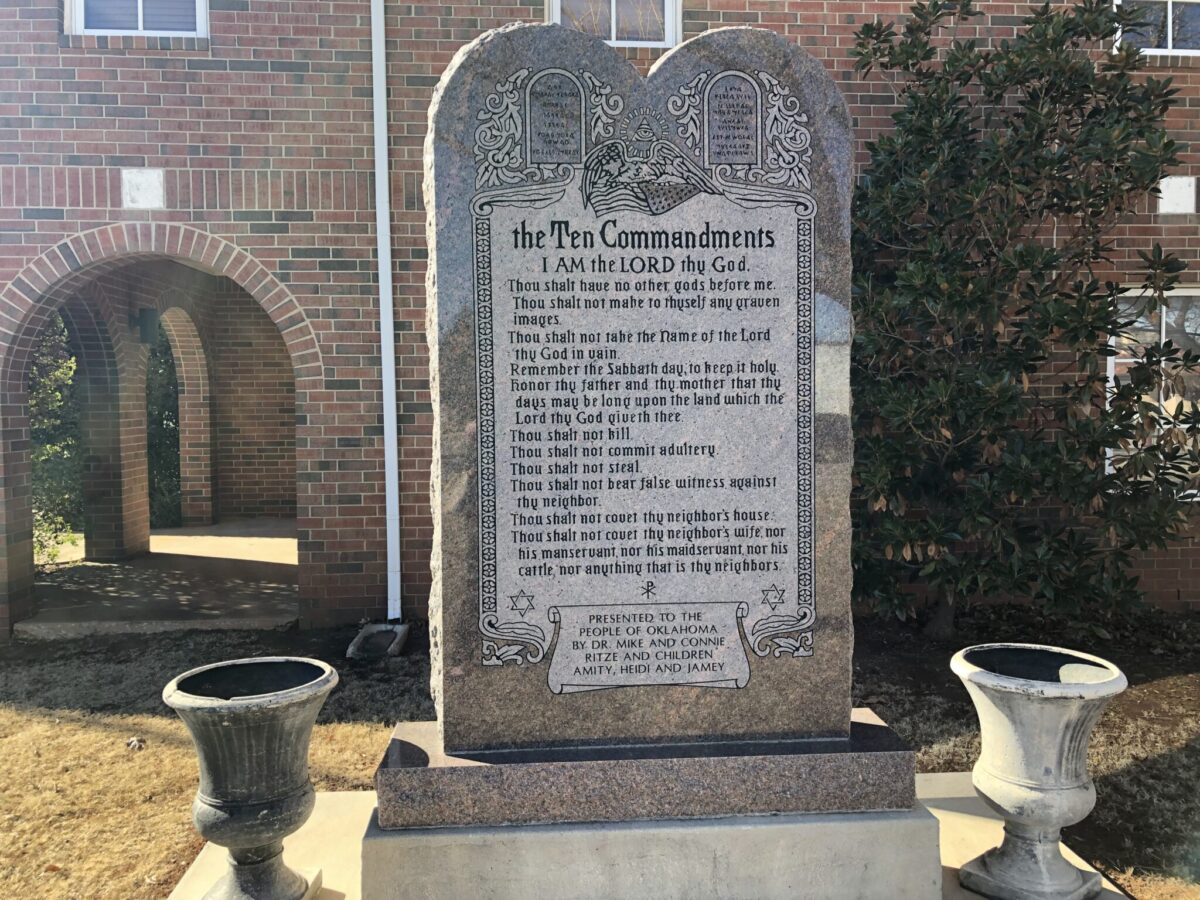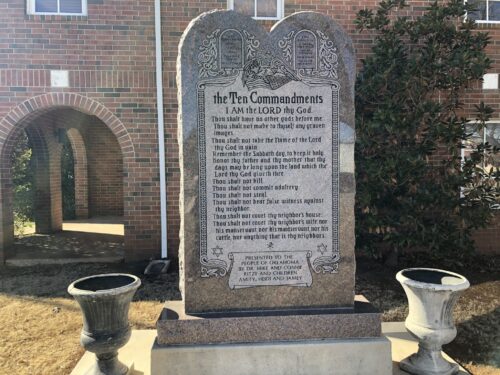
Louisiana public schools would be required to display the Ten Commandments under legislation that advanced Thursday from committee, despite a limited history of such displays passing muster with the U.S. Constitution.
Rep. Dodie Horton, R-Haugton, and Sen. Adam Bass, R-Bossier City, co-authors of House Bill 71, told members of the House Committee on Education they believe their proposed law would survive court challenges.

A state-owned, privately funded Ten Commandments monument in Oklahoma. (Photo by Barbara Hoberock/Oklahoma Voice)
Efforts to set similar requirements in other states have not succeeded, with lawmakers in Texas and South Carolina falling short last year. A comparable bill is under consideration in Arizona. The chief obstacle to such proposals has been the Establishment Clause of the First Amendment, which prohibits any law and government action from standing up an official state religion.
A U.S. Supreme Court ruling in June 2022 has given new hope to those who want the Ten Commandments publicly displayed. In the case Kennedy v. Bremerton, justices ruled in favor of a Washington state high school football coach who was fired for praying at midfield and allowing students to join him after football games. Joseph Kennedy was reinstated after conservative justices prevailed in a 6-3 decision, saying the post game prayers do not amount to a school endorsement of Christianity.
Mississippi attorney Ronald Hackenberg, who accompanied Bass and Horton at the committee meeting, said the Kennedy ruling benefited from justices disregarding standards that have been applied since the 1971 case Lemon v. Kurtzman. Known as the Lemon test, the principles are used to determine whether a law or government violates the First Amendment.
In the Kennedy case, the justices looked at the history of rulings regarding the Establishment Clause and interpreted the intent of the Constitution’s authors rather than rely on the Lemon test, Hackenberg said.
“Both Representative Horton and I believe it will withstand legal and judicial scrutiny, as well as this bill is the first of its kind since the fall of the Lemon law [sic]. We hope it will serve as an example to the rest of the country,” Bass said.
Hackenberg told the committee he was affiliated with the Pacific Justice Institute. The organization has been designated a hate group by the Southern Poverty Law Center for its anti-LGBTQ+ stances. Its founder, Brad Dacus, has claimed gay marriage leads to polygamy and incest, among other falsehoods.
What is the Lemon test?
The U.S. Supreme Court has traditionally used a three-part test to determine whether a law or government agency oversteps the First Amendment’s prohibition against the establishment of a state religion. The standards, known as the Lemon test, say government can assist religion only if:
1. the primary purpose of the assistance is secular;
2. the assistance must neither promote nor inhibit religion; and
3. there is no excessive entanglement between church and state.
The American Civil Liberties Union of Louisiana opposes House Bill 71. Its advocacy strategist A’Niya Robinson said in an interview that specifics of the Kennedy case aren’t applicable to the legislation being considered. The coach’s prayer after games fell outside his responsibilities as a school employee, and students weren’t required to participate, she explained.
The Horton-Bass proposal would place students, who are compelled to attend school, in a difficult position as a captive audience forced to consume Christian doctrine, according to Robinson. Public schools also offer students access to religious concepts and teachings through world religion and certain social studies courses, she said. In addition, books of faith are available at school libraries, and students are free to engage in religious activities through extracurricular groups.
“One of the things that the framers of the Constitution had in mind when they came up with the First Amendment was that religious freedom only flourishes if people have breathing room to decide what religious beliefs, if any, that they want to follow,” Robinson said.
The education committee voted 10-3 to send Horton’s bill to the full House. Rep. Barbara Freiberg, R-Baton Rouge, cast one of the no votes, having questioned whether the Ten Commandments was representative of all faiths. Rep. Sylvia Taylor, D-Reserve, joined nine Republicans in support of the bill.
This is Horton’s second foray into required displays linked to religion. Last year, she and Rep. Jack McFarland, R-Jonesboro, received approval for a bill to put “In God We Trust” signs in every classroom, and Gov. John Bel Edwards signed it into law.
Like that proposal, the Ten Commandments would have to be displayed on a poster or framed document that is at least 11 by 14 inches and “be printed in a large, easily readable font.”
The specific verbiage for displaying the commandments is spelled House Bill 71. It allows, but doesn’t require, schools and their management boards to spend their own money on the displays or accepted donated versions.
Louisiana Illuminator is part of States Newsroom, a nonprofit news network supported by grants and a coalition of donors as a 501c(3) public charity. Louisiana Illuminator maintains editorial independence. Contact Editor Greg LaRose for questions: info@lailluminator.com. Follow Louisiana Illuminator on Facebook and Twitter.






